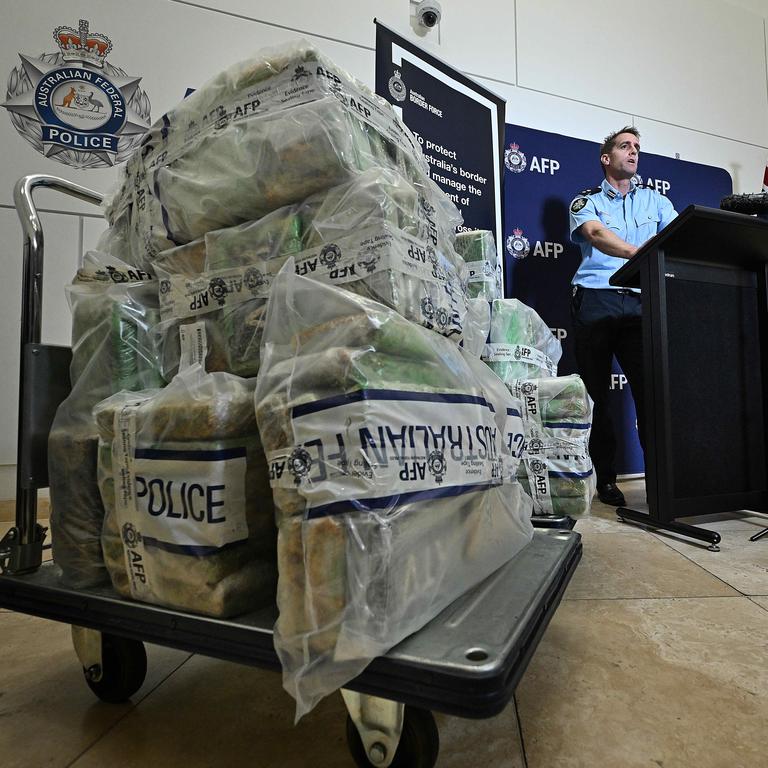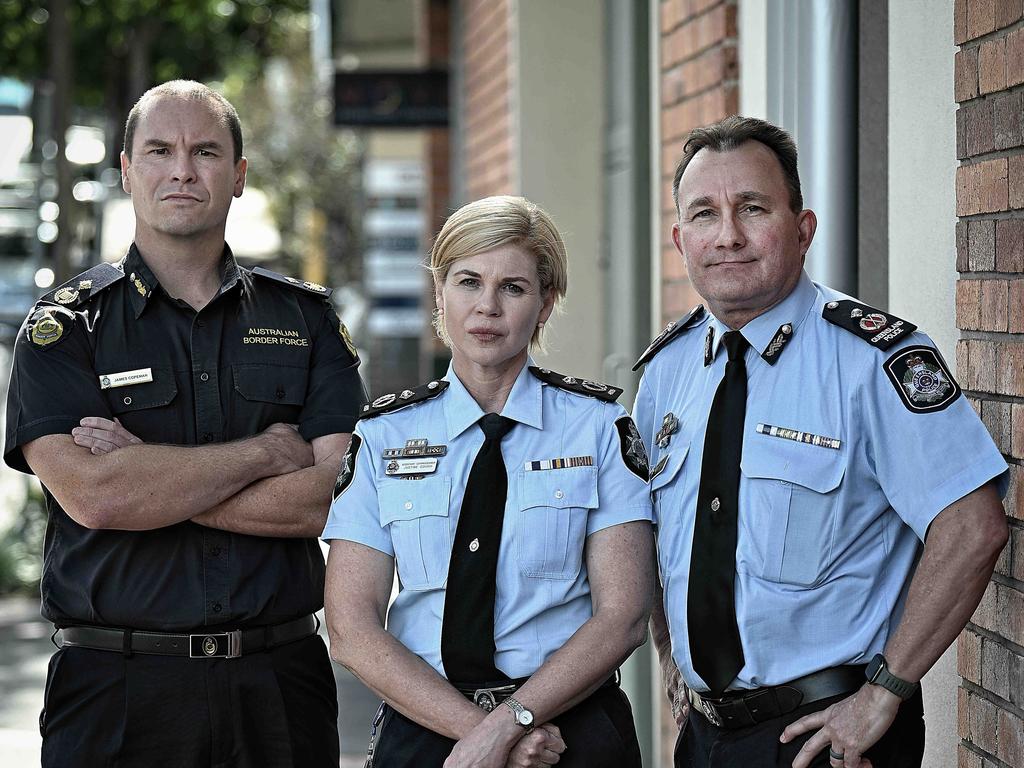Queensland cocaine seizures have hit an all time high, with law enforcement heads warning organised crime cartels are trying to exploit vulnerabilities in the state’s large coastline.
Australian Federal Police seizure figures show 272.4kg of cocaine was seized in Queensland in 2022 which increased 107 per cent to 565.2kg in 2023.
Huge joint agency busts by the Australian Federal Police, Australian Border Force and Queensland Police Service have led to even more seizures this year with 811.9kg taken off the streets in just the first four months of 2024.
Crime groups have been caught taking low altitude “black flights” from regional airports, hiding cocaine in hulls of ships and using small boats to meet up with cargo ships out at sea in some of the most recent seizures.
In April alone, police arrested a man after 289kg worth of cocaine $94m sent to Brisbane Airport from Papua New Guinea; a Queensland man was charged with a botched 900kg import and other shipments and three NSW men were arrested after allegedly trying to import 500kg worth $162m off the coast of Gladstone.
In a frank admission authorities said they suspected only about 25 per cent of drugs were being seized nationally as they continued their war on drug cartels.
The increase in seizures comes as crime gangs are using “trusted insiders” at ports to throw in hauls of drugs into legitimate shipments and using Pacific nations such as Papua New Guinea as “drug transit hubs” to funnel hauls in via Queensland.
In a rare sit-down, law enforcement heads spoke with The Courier-Mail about the mass seizures and the lucrative profits cartels are trying to make as cocaine hovers between $150,000-$200,000 per kg wholesale, or $350 or more a gram, while costing just $2300 per kg in Colombia.
AFP Northern Commander Assistant Commissioner Justine Gough said crime syndicates were looking for opportunities to exploit any vulnerabilities in Queensland’s large coastline - but also nationally - because of the high profits from cocaine sales.
“It’s all and any organised crime group and it really is about the generation of really high profits, because it is quite a lucrative market,” Assistant Commissioner Gough told The Sunday Mail.
Assistant Commissioner Gough said downstream effects of illicit drug consumption were obvious and devastating to the community.

“Their use can contribute to the road toll, family violence, child neglect, drug wars playing out in suburbs,” she said.
“A motorist affected by drugs can be the equivalent of a loaded weapon behind the wheel of a car.
“The AFP Commissioner Reece Kershaw has previously said that as a society we cannot accept the reality where parents buy meth over milk, or where families are the potential collateral damage of gangs who shoot at each other for drug territory in our suburbs.
“The upstream effects of illicit drug trafficking can include money laundering, the trafficking of guns and other weapons, corruption at our borders and foreign interference.”
Assistant Commissioner Gough said the AFP, QPS and ABF were working even harder together to outsmart organised crime groups.
She said authorities believed the recent increase in detections and seizures was due to increased efforts in intelligence and detection by agencies working together as syndicates tried to import even more drugs to take advantage of increasing prices of illicit drugs.
Networks were operating more rapidly across borders, which had been in part enabled by dedicated encrypted communication devices that criminals were lured to because they believed they could outsmart law enforcement.
Criminal networks were using transport companies, hire vehicles and low-paid criminals to move drugs across borders, she said.
“There are plenty of lowly paid criminals willing to risk significant jail time for as little as $5000 to $10,000 to drive illicit drugs from one state to another,” she said.
“We suspect drugs imported into Queensland are delivered primarily to Sydney and Melbourne using a variety of transport companies.”
Australian Border Force Northern Assistant Commissioner James Copeman said authorities had “doubled the strike rate” with cocaine shipments.
He said it was hard to know the amount of drugs being imported into the country as agencies refined processes for catching criminal networks.
“We do have a figure of approximately, we think we’re getting around 25 per cent of drugs that are coming through the border (nationally),” Mr Copeman said.
Assistant Commissioner Copeman said there was a non-traditional supply chain that organised crime networks had tried to use in the last six months using “international merchant vessel traffic to be able to drop narcotics off at sea” and authorities had made changes to respond to it.
“So we are seeing volumes increase but at the same time, our detection rates are increasing as well,” he said.
Assistant Commissioner Copeman said authorities had uncovered traditional smuggling and concealments, many which were “no match” for the technologies authorities had in place.
“But we also have seen over the last few years, any increase in what I would call a rip methodology as well,” he said.
“So this is where we would have what we call a trusted insider in a particular country that might work on wharf, access a container, simply chuck in a couple of couple of bags of narcotics on to what is a legitimate import with another trusted insider being placed in the port of call for them to be able to access that as well.”
Assistant Commissioner Gough said a United Nations Office of Drugs and Crime global report on cocaine found global production of cocaine was at an all time high in 2023.
Police had intercepted two “black flights”, in which planes take off in regional airports and fly at low altitude, relating to Queensland since 2020. Papua New Guinea and other Pacific nations were being used as drug transit hubs.
“Obviously, it’s quite a risky venture,” Assistant Commissioner Gough said.
“A lot has to go right for a black flight operation. And I think that there’s other ways in which organised crime groups are able to perhaps import drugs without that risk.”
The AFP seized about 7.7 tonnes of cocaine between 2019 and 2021, with 73 per cent in NSW, 12 per cent in Queensland, 7 per cent in Victoria and 5 per cent in Western Australia.
Since 2022, the AFP has seized 14 tonnes of the drug, with 45 per cent in NSW, 22 per cent in Victoria, 17 per cent in Western Australia, 12 per cent in Queensland and 3 per cent in South Australia.

Queensland Police Service acting Deputy Commissioner Brian Connors said police were concerned about the consumption of any drugs and alcohol as it created societal problems.
He said the demand was high for a range of substances which had different types of “escapism routes” for people.
“Certainly from a human perspective, it’s extremely disappointing, because that’s money that people could and should be using on other priorities in their lives,” Deputy Commissioner Connors said.
“You know, family costs, food, the basic cost of things that these types of activities are taking peoples’ funds away.
“Our view is that eradicating the opportunity for these groups to bring those things to market takes away a lot of those risks and downstream social harms that are exacerbated by excessive drug use, or excessive alcohol use, or anything that’s diverting people’s money away from other than living and looking after people they’re responsible for.”

Collaboration between AFP, ABF and QPS through joint organised crime taskforces has been ongoing for 10 years.
“We’re not here to muck around,” Deputy Commissioner Connors said.
“We’re here to get in and get the job done and deliver results as best we can. And whether that is disruption, whether that is investigation and arrest, it’s the best result that we can deliver through the might of the combined agencies to stop the top end profiteering, the organised crime groups, but also those crimes being committed at the lower end as well.”

How Sydney man allegedly stole millions from colleagues
Nuno Guerreiro, of Dolls Point, allegedly stole more than $4 million from his colleagues. Read how police allege he did it.
Hospitals, houses and highways delayed as sparkies strike
Critical infrastructure projects are being held up across the state by striking electricians, with small business owners warning they’ll be bankrupt by Christmas and energy giants accusing the ETU of holding NSW to ransom.
James Packer: ‘I was a complete zombie’
In his first TV interview in more than a decade, the 57-year-old billionaire has spoken candidly about his mental health issues, taking Ozempic and his breakups with Erica Packer and Mariah Carey.
NSW to miss housing targets by whopping 74k homes
High interest rates and a desperate shortage of builders will cripple the Minns government’s plans to build 75,000 homes a year, a peak housing body has warned.
Mayoral candidate wants to be Pied Piper of Sydney
Independent Sam Danieli has a novel plan to end the city’s ‘rat plague’ and rid the vermin from our streets. Find out what it is.
Grief tears through Coffs after missing woman’s tragic death
“Rest easy in the Dreamtime”: Tributes are flowing from a heartbroken community after a woman reported missing was found dead on the Coffs Coast.